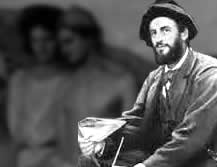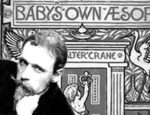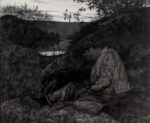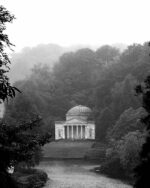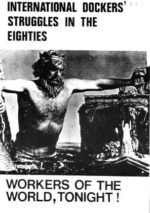Description
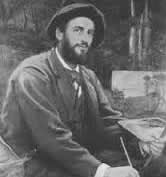 Admire George James Howard’s painting of ancient Mediterranean farm labourers being brought water to quench their thirst. Refreshing the Reapers (c. 1870), now in Tullie House Gallery in Carlisle, is in the style of the ‘Etruscan School’ of painting, emotive landscapes of Etruria in central Italy. But Howard’s picture imagines ancient Etruscan society in its beauty and sensual physicality. Another painting by Howard portrays peasant women reclining in the ruins of the Baths of Caracalla. In both scenes it is the working people and their social community, rather than the landscape, which count.
Admire George James Howard’s painting of ancient Mediterranean farm labourers being brought water to quench their thirst. Refreshing the Reapers (c. 1870), now in Tullie House Gallery in Carlisle, is in the style of the ‘Etruscan School’ of painting, emotive landscapes of Etruria in central Italy. But Howard’s picture imagines ancient Etruscan society in its beauty and sensual physicality. Another painting by Howard portrays peasant women reclining in the ruins of the Baths of Caracalla. In both scenes it is the working people and their social community, rather than the landscape, which count.
Howard, who was close friends with the socialists William Morris and Walter Crane, as well as Burne-Jones, was anything but lower-class himself. He was educated at Eton and Cambridge (where he was influenced by the lectures of Charles Kingsley) and inherited his title Earl of Carlisle, along with the 78,000-acred Howard Estate, in 1889. His main aim in life, besides painting, was to make fine art available to everyone. Howard was a trustee and then chairman of the National Gallery, helped found the Tate Gallery, and was a member the Society for the Protection of Ancient Buildings.
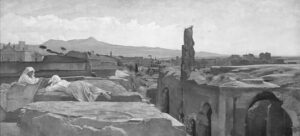 His political views were, if not radical, then philanthropic and progressive. His wife was an ardent supporter of women’s suffrage and the temperance movement, and ensured that the dreamy George, who would have been happy to paint all day, was kept up-to-date on political issues. As Liberal MP for East Cumberland 1879-1880 and 1881-1885, and subsequently in the House of Lords, he argued patiently for the provision of excellent artworks in provincial museums, and for the opening of museums and art galleries on Sundays. He said in parliament that British people of all classes ‘had a right to see the treasures of which they were joint owners on the only day it was convenient for them to go there.’ Moreover, since ‘Trade Unions had secured great advantages’ in securing half-days and holidays for their members, they needed places to visit where they could enjoy high culture. He also campaigned to keep children out of public houses, for the pension rights of policemen, and for the employment of ex-servicemen in the art galleries and museums of the nation.
His political views were, if not radical, then philanthropic and progressive. His wife was an ardent supporter of women’s suffrage and the temperance movement, and ensured that the dreamy George, who would have been happy to paint all day, was kept up-to-date on political issues. As Liberal MP for East Cumberland 1879-1880 and 1881-1885, and subsequently in the House of Lords, he argued patiently for the provision of excellent artworks in provincial museums, and for the opening of museums and art galleries on Sundays. He said in parliament that British people of all classes ‘had a right to see the treasures of which they were joint owners on the only day it was convenient for them to go there.’ Moreover, since ‘Trade Unions had secured great advantages’ in securing half-days and holidays for their members, they needed places to visit where they could enjoy high culture. He also campaigned to keep children out of public houses, for the pension rights of policemen, and for the employment of ex-servicemen in the art galleries and museums of the nation.

